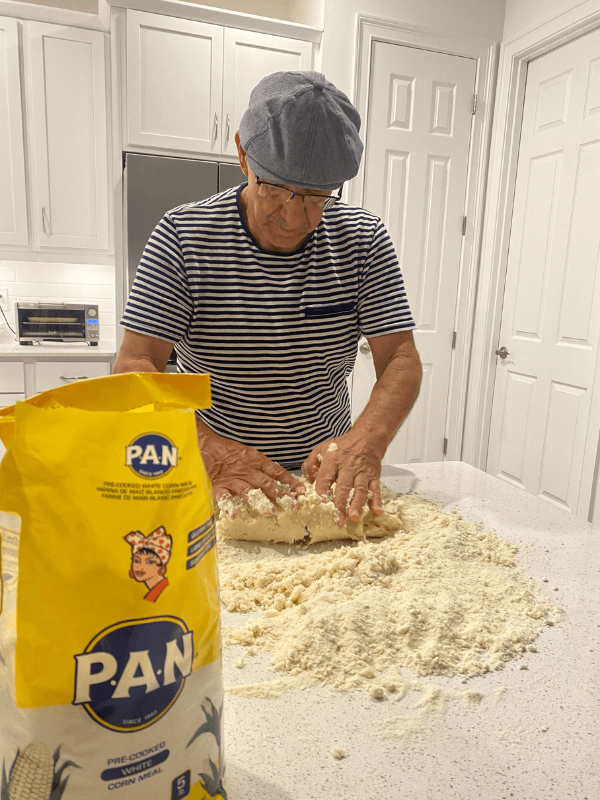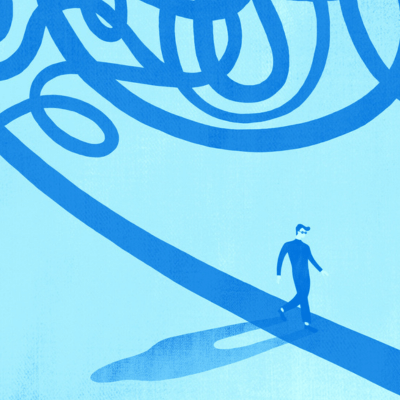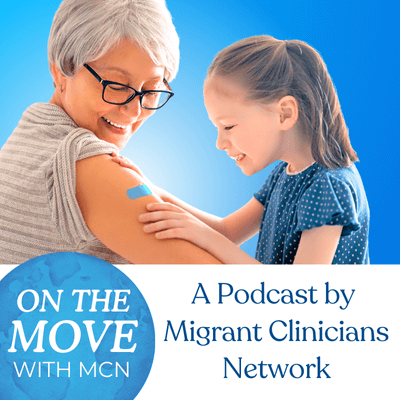Camila Velasquez: Special Connections to Specialty Care

[Editor’s Note: Our Health Network Associates save lives, every week. They provide critical, hands-on case management for migrants and asylum seekers with ongoing health needs that may otherwise be unable to access care during and after their migration. Read other Associates’ stories: Enedelia, Saul, Alma, Robert, Norma, Nestor, Joshi, and Brenda]
Camila is very responsible and cares about her patients! She is a great communicator. Amazing person to work with. She goes above and beyond for her patients, and she is always willing to help in any way possible. She is doing a great job! It's an honor to work with her!
– Elizabeth Gonzalez-Ibarra, Health Network Associate
Camila is one of our newest Health Network Associates and she is already working like a veteran pro. She has taken some of the most difficult and challenging cases especially those involving our most vulnerable ones - children, build relationships with the parents who trust her, and remains persistent until she succeeds. She also gives professional presentations at webinars and adds a sense of humor to occasions that need it. It is a pleasure to work with her.
– Laszlo Madaras, MD, MPH, Chief Medical Officer
Camila Velasquez is unique among our Health Network Associates. As the only associate dedicated solely to the Specialty Care Access Network program (SCAN), Velasquez focuses her support on the families and caregivers of children with advanced health needs enrolled in SCAN. This program assists migrant children who have recently left detention and immigration shelters to find pediatric, specialty, and emergency care in their receiving communities. To find that care, Velasquez partners with SCAN champions, volunteer doctors across the country who, when called by Velasquez, activate their networks to find charity or low-cost care for the patients in their region. This program, and Velasquez herself, have saved lives in the past. Together with SCAN champions, Velasquez is able to fight for the best possible outcomes for migrant children. Here, we ask Velasquez about her work and her life outside of MCN.

I want to start by giving you an opportunity to introduce yourself and what you do at MCN!
My name is Camila Velasquez. I'm the Health Network Associate primarily in charge of the specialty care cases that we receive. I focus on the patients 18 and under that require a specialist. If they need a neurologist or need to be connected to any specialty care, we help expedite that process in the United States. [Many of us have experienced that] even if you are insured and you have a primary care doctor, it can take quite a bit of time to get connected to a specialist. So we help those children that need that care immediately. That makes all the difference in their health outcomes. Expediting that process is not something that is easy to do. I help navigate the medical system for these patients, [and their] parents and family members who help out.
What would be an example of a type of case that would need specialty care?
Right now I'm excited about a specific case that I have. This case was in 2021 when it started out. The reason it's still active is because of the state that the patient is in. They live in a rural area, and this is a patient who has a giant facial mass that's obstructing their vision. It gives them headaches. There are multiple specialists in charge of this because it's a very sensitive type of surgery needed. They were uninsured when they were first enrolled, so there was the process of getting them signed up for financial assistance, and where they live, that takes a long time to get approved. Since they live in such a rural area that transportation didn't come easy. We have the Uber services, but for this case, it doesn’t work all the way out there. They struggle getting to these appointments or being able to get to a health center that's nearby the hospital, which is an hour and a half away.
It is a bit complicated for the patient's mom to get them into care, but fortunately they’ve now been approved for financial assistance. We've been maintaining contact, me and the mom, so she updates me on anything regarding the patient’s care. They are scheduled for surgery soon, and it's been a long time coming, but I'm really excited for this patient and just hopeful for their surgery. That's one of those cases that I'm just happy that we were here to help because it wasn't easy for the family.
What is the enrollment process for SCAN and how is it unique to the rest of Health Network?
It does function a bit differently in the sense of enrollment. We have a new portal enrollment that Saul [Delgado, Health Network Data Specialist] created, so that's still the process that some referring clinics go through. But I have a relationship with our SCAN champions who are volunteer doctors who help and guide us within the state that the patient is in. For the most part, we have a lot of doctors who volunteer throughout the US. There are some states that we don't have a SCAN champion, just because we don't have connections there as of yet, but we have doctors in California and Texas and Florida and so on, thankfully mostly our patients are headed to those bigger states. I reach out to them after I get information from the patients or their families and I give a rundown of what the patients need or what specialty care they might need and if they can help connect me to a federally qualified health center or if they think the patient should be taken to a hospital right away or anything else they might suggest. It does vary case by case.
After I reach out to those doctors that help review these cases, they help in expediting the process or suggest they go to a pediatrician to get evaluated, and from there they can be referred to a specialist. For the most part, after getting in touch with the patient's family, I send out an email to our SCAN champions. I also meet with Dr. Laszlo Madaras and Dr. Marsha Griffin and Dr. Karla Fredricks every two weeks or so to review these SCAN cases. Since I'm not medically qualified, they help in reviewing the cases and determining the severity of the diagnosis of the patients so I can prioritize and figure out if a patient needs to go into the ER right away or if I can get them a pediatric appointment before connecting them to a specialist.
To what extent does Dr. Fredricks work with MCN and SCAN?
So she meets with me every two weeks to review the cases and help guide me if I have any questions. She doesn't meet with us for [weekly Health Network meetings called] huddles, so she is more focused on overseeing the SCAN program and works a support system for me. If I have any questions, I just message Dr. Fredricks and/or Dr. Griffin directly. They’re my main points of contact, if I have any questions regarding a case or if I need to update them on any of the patients’ needs, or if I need help with contacting a SCAN champion. They have a connection with the other SCAN champions as colleagues, so they can help in reaching out and letting them know we need their help.
Does Dr. Fredricks work as a SCAN champion for one of the states?
Yes, she is in Texas.

So, we also of course want to ask some questions about you. Could you tell me a little bit about your family history and your connection to migrant populations?
I was born in Colombia. I moved to Miami when I was two years old, and I was basically raised there my whole life. We did move back to Colombia when I was around 10. My dad's work visa expired, so we had to move back and start that process again. Thankfully, it only lasted a year. Not everyone is that lucky. Sometimes you have to wait a lot longer, but we were able to come back to the US and go back to the community that we were used to. I had already established friendships and everything. It was great to have that moment in Colombia, though, to reconnect with my family there.
But I would say that I'm very much a Miami person. That's where my community is. Regarding Migrant Clinicians Network and I believe I said this when I was being interviewed [for the position at MCN]: The main thing that really stood out to me was that I wished Health Network was something that I had as a resource when we first moved here. I know my mom struggled a lot with getting me into care, with getting my brothers into care. Growing up watching her struggle doing that, I'm glad to be a point of contact for a new family here in the US to help guide them.
What is your educational background and how does that tie into your work?
I was a psychology major. I went to Florida International University (FIU) for psych and I've been looking into getting my master’s now. Actually, working within SCAN has kind of broadened my idea of what I want to do with my career. I have been looking at different programs and have been wanting to work with kids.
SCAN has been really nice because I started out at MCN with prenatal cases for a few months and then they had me transition over to specialty care for patients 18 and under. I didn't know if I could help children -- I had worked at an elementary school for two weeks and I had thought, “I'm not doing this” -- but now I'm like, “Oh, I want to work with kids.”
I'm curious, when you switched from the high stress, in person job during the pandemic to working from home, how was that transition?
It is wonderful, especially now. When I first started with MCN, I was still living in Miami. It really helped in balancing my life out, no longer waiting in traffic to get to a job, not having to deal with the environment that Miami sometimes has. Miami thrives on chaos, and I'm not like that. I feel like even though MCN is remote, I've had more of an opportunity to connect and build relationships with the patients and their families, even if it's through the phone than I ever did at my old job, which was in person.
It is really special. I do hope one day to meet everyone within MCN face to face. I always talk about how W2W and the Monday staff meetings are so special to me because even with being in-person at my old job, I only ever really connected with one person. But here, just speaking to people, like with you or Claire, I know we're so far from each other, but I can talk to you guys about anything. I don't know, MCN is just special that way.
I am curious about the work life balance for SCAN, I know that Health Network Associates, because there's so many of them, are able to balance things with each other well. What about with SCAN? Do you have backup and support for more urgent cases?
So as you know, we meet Mondays, Wednesdays, Fridays for huddles within Health Network. When I first started getting these SCAN cases, there weren’t as many as we're seeing now. We have been seeing an increase in referrals for children's specialty cases. We're all very open with each other with how overwhelmed we are, or if we are feeling like we need help. But since, as you mentioned, I am the one in charge of the specialty care cases for children, it was hard to know who to reach out to because everyone else has probably the same amount if not more cases than me, so I don’t want to burden them. But we have talked about it, and recently we have a new intern. Her name is Ebi, and she's going be helping me out a bit more so I don't fall behind on any cases and she can help with anything I need help with. Del also mentioned that with Dr. Laz's help, we’re reviewing any new enrollments to see if they're not actually in need of specialty care. If they just need a pediatrician, then another Health Network Associate can take that case instead of me. We've all been working with communicating on just like the level of overwhelm we feel and if people have time or are willing to help with a case. Luckily, we all have a really good connection when it comes to that. We help each other out wherever we can.
Earlier you mentioned the Uber program and how it wasn't able to be helpful when somebody is in such a rural and remote location and their hospital so far away. I was curious how often you run into problems like that when trying to work on transportation.
For the most part, as I mentioned with Saul’s data reporting, we have noticed that most patients are going to bigger states that have more resources, such as California, Florida, but even within those states, sometimes transportation isn't easy to get. For example, I had a patient who was in North Carolina and the closest health center was like 10 miles away, which to someone with a car, that's no problem, but waiting for an Uber within the area of need is harder. The Uber can often take like 30 minutes, and people have to be ready for pick up and sometimes it falls through or they end up cancelling it for whatever reason. You have to keep an eye out on those more rural areas to make sure they actually get picked up.
That's something that we're keeping track of in terms of reporting to Uber and Save the Children. For the most part, I've been pretty successful using the Uber program and having them set up to get patients where they need to go. And we do have Ana, our part time social worker, who, if the patient is in too rural of an area and Uber is nonexistent, she helps us in look for other transportation programs that we can set up for the patient. Where Uber isn't a thing, we try to not let that be an obstacle, and we help connect them with other services in the area.

You shared at a staff meeting pictures of your partner meeting your grandfather for the first time recently, I was wondering if you wanted to tell us a bit about that?
My partner, Luis, comes from a Cuban family. His father was born in Havana and moved to Miami when he was around the age of two. His mother was born in New York to Cuban parents and eventually she moved down to Miami where they met and fell in love. Because of his parents being raised in the United States, my partner grew up very Americanized. I was very concerned about this since my mom's side of the family only really speaks Spanish and I grew up pretty differently to how my partner did. Very quickly, we realized that this language barrier didn't interfere. I always joke around and say my mom and Luis get along more than her and I, even though we speak the same language, my partner and her just look at each other and know what the other is thinking before I can even catch up.
My mom's side of the family bonded well with my boyfriend as he likes to teach them English, and they will teach him Spanish. When they don't understand each other, I step in and assist but there's no better helper than food. Luis is a huge foodie just like my family. When my family comes to visit my partner will wake up early to have coffee and breakfast ready for them while my mom will prep us a bunch of meals, so we don't have to worry about that for a few weeks.
I was very excited to have my grandpa come to visit recently as my partner hasn't been able to meet my family that still live in Colombia. Him and I started dating during COVID, so we haven't been able to visit together, and right now the political state of Colombia has us concerned, so my grandfather came to visit. My grandpa was born in Medellin, so he has a very thick paisa accent which even I struggle to understand sometimes so my partner was a bit concerned. He didn't need to be though... they bonded over food. My grandpa taught him how to make arepas properly and my partner taught him how to barbecue and made him a lovely lamb dinner. They showed each other their interests and hobbies while eating and whenever they hit a roadblock in language, they would look over at me and my mom to step in. For the most part they understood each other without us needing to step in. My grandpa instantly loved my partner especially just by seeing the way he treats me, my grandpa said he didn't need to understand English to know he is a good man - but it would be nice. Now my grandpa is also making an effort to learn English so he can communicate better with my partner.

I’d also love to hear a bit more about what you brought up at the staff meeting - the possibility of your grandpa moving to the States.
Recently, my grandmother passed away, so my mom has been in Colombia looking after my grandpa and helping him sort out their stuff. We spent a lot of our childhood with my dad's side of the family since my mom's side of the family couldn't really travel until later on in life. Because of this, my grandpa and my mom's side of the family feel like they missed out on a lot and want to make up for that time, my grandpa especially. Now that he doesn't have his “partner in crime,” as he calls her, by his side, he wants to spend the rest of his life being with us. He came to visit all of his grandkids and great grandkids. His first stop was in Fort Lauderdale where his son and my cousins live. Both of my cousins recently had kids, so he's been wanting to meet them, and they fell in love with my grandpa. He then came to visit me and then my oldest brother. When he stayed with me, he spent a lot of time in our back patio where I have two chairs. He wouldn't let my mom sit next to him as he insisted that my grandma was sitting right next to him. That day he spent two hours in the morning outside talking to her. When he came back inside, he told me that my grandma is really proud of me, and she loves our new house and that she's here with me. My grandpa felt a peace come over him when he came to visit me, and he told me he would love to live near his family. My mother and brother live with him over there, but my brother and his girlfriend are planning to move to the States for better opportunities. My mom and I are working on getting them all over here so we can spend more time together as a family.
Interested in becoming a SCAN champion to help migrant children in need of specialty care in your state? Reach out to cvelasquez@migrantclinician.org to find out more!
- Log in to post comments






